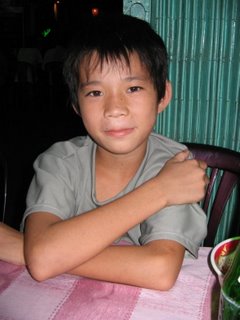Leaving Hanoi was very painful... I just hope these next few weeks fly by. I'm missing the center and the kids already.
Even though I am far away, I'm still working with the staff team via email (how did any organisation operate effectively before the internet??).
In a recent blog, I levelled some criticisms against the big NGOs that work in the anti-human-trafficking field. Since then, a few people have made comments - but have asked that they not be added to the blog site. Seems to be quite a sensitive issue.
What really gets me mad is the simplicity of helping kids who have been trafficked. I accept that it is not always simple, but if I can walk down a street and talk to a child who has been trafficked, then why is it so difficult to help that child go home? Why does an international NGO have to spend millions of dollars, and yet these kids are still on the streets?
The Blue Dragon lawyer, Van, is currently talking to the parents of two children from Hue, who have both been trafficked to sell flowers in southern Vietnam. This involves working from 8pm until 4am, around night clubs where foreigners hang out. They earn a small fortune, all of which they give to the trafficker. Typically, the trafficker pays their family about $70US for the child, and earns in excess of $100 per month. Each trafficker might have 10 or more children working for them. And the traffickers are both male and female.
Why do the parents let this happen? Because they are desperately poor, have no education, and are deceived by the trafficker.

(The boy above is Viet, whose parents were tricked into letting him be trafficked)
When Van spoke to the parents of these 2 kids on the telephone, they were genuinely shocked to hear that their children are working all night. The trafficker promised that their kids would go to school, and just do some simple part-time work, while living in the luxurious conditions of the Thao Dan youth refuge.
Now that the parents know, they are determined to get their children back. We are watching closely to see if the trafficker allows the children to leave. Stay tuned...

1 comment:
Hi Tom,
My experience is that both the children and the parents must be willing for the kids to return home. Some families are satisfied with the situation they find themselves in.
But if there is a willingness for the family to be reunited, the next step is to address the issue that caused the initial problem - and this is usually extreme poverty. The Vietnamese government is already working a lot on poverty alleviation, and has made great strides, but of course there are many gaps that need to be filled in the short term.
As for the trafficker and other obstacles... Vietnamese law is very clear on child trafficking. If somebody does try to keep the children against their will, or punish the family, the law can be brought down on them. This is a role that NGOs - foreign and Vietnamese - can play, acting as advocates for the victims.
Post a Comment